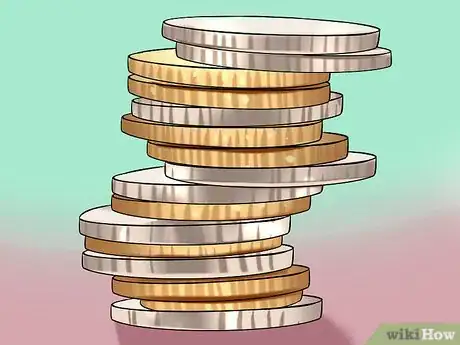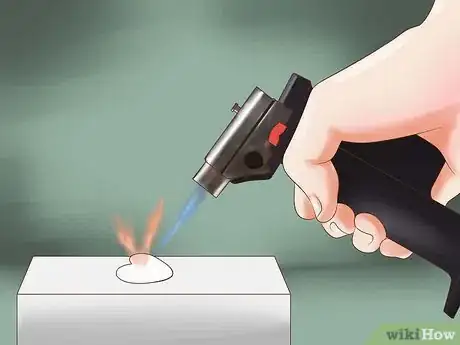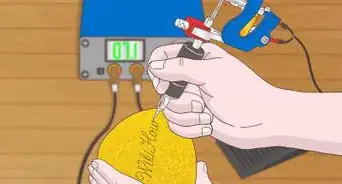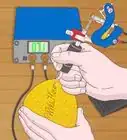This article was co-authored by Nicole Wegman. Nicole Wegman is the Founder and CEO of Ring Concierge, a New York City-based fine jewelry brand. Specializing in engagement ring and wedding band trends, Ring Concierge creates a luxury experience catered towards millennials. Ring Concierge offers engagement rings along with earrings, necklaces, bracelets, and anklets. Nicole's work and Ring Concierge have been featured in Vogue, Glamour, Who What Wear, Martha Stewart Weddings, Brides, and Cosmopolitan. Nicole is a GIA (Gemological Institute of America) Accredited Jewelry Professional and holds a BS in Fiber Science and Apparel Design from Cornell University.
There are 10 references cited in this article, which can be found at the bottom of the page.
This article has been viewed 67,991 times.
Jewelry design and fabrication is a highly specialized form of functional art that represents an enormous, billion dollar industry. Becoming a jewelry maker requires more than making sketches of your own ideas. It also requires an in-depth knowledge of metals and gems, careful craftsmanship, and an understanding of fashion trends. If you want to become a jewelry maker, you may need to pursue an education in jewelry design and craftsmanship, but other pathways might also help you gain experience in the field.
Steps
Getting an Education in Jewelry Making
-
1Consider whether you wish to pursue a formal education in jewelry making. Many jewelry makers entered into the profession after earning a formal degree in Gemology, Jewelry Design, or Accessory Design.[1] However, a formal degree is not strictly necessary. Some reasons to strongly consider a formal education include:
- If you are brand-new to the profession and have no contacts in the industry
- If you will need to use advanced software or 3-D printing technology in your jewelry designs
- If you hope to work for a large jewelry manufacturer that requires formal degrees
- If you wish to pursue competitive, highly sought-after managerial positions in the industry[2]
-
2Consider whether the costs of a formal degree are worthwhile. Even though education can provide one pathway to a successful career in jewelry making, many successful professionals used alternative methods to get their jobs. These strategies include networking, apprenticing, or growing a small, informal side business into a larger company.[3] A formal degree in jewelry making is not necessary for every aspiring jeweler and should be considered carefully. Some reasons not to pursue a degree in jewelry making include:
- If you wish to pursue jewelry making as a hobby, part-time job, or side business instead of your full-time career
- If you already have a local client base for your jewelry designs[4]
- If your jewelry designs can be accomplished without sophisticated tools or technology
- If you have contacts in the industry who can give you an apprenticeship or entry-level position
- If you are unable to pay for a degree
- If you are unable to spend 1-4 years pursuing a degree
Advertisement -
3Choose the skills you wish to learn. There are dozens and dozens of schools, institutes, and programs that provide training in various jewelry making techniques.[5] However, these schools can differ in their emphases and training programs. Before you enroll in a program, decide on the specific set of skills you wish to acquire. That way, you will know whether a program will fit your needs. If you want to open your own independent boutique, you might wish to choose a program that will help you learn how to run your own business or design scarves. If, however, you wish to craft jewelry for a large ring manufacturer, you might want to find a program whose sole focus is on gemology, gem-cutting, and gem-setting. Some possible skills you might wish to learn could include:[6]
- Metalsmithing and blacksmithing
- Gem appraisal, cutting, and setting
- Waxwork
- Mold-making
- Engraving
- Watch repair
- Graphic design software and technology
- The history of jewelry making
- Jewelry design
- Accessory design (such as scarves, handbags, etc.)
- Retail management
-
4Decide whether you want a certificate, Associate's degree, or Bachelor's degree. There is a wide variety in the types of degrees and certificates you can pursue in jewelry making, from a certificate you can attain in a few weeks to an official 4-year degree from an accredited university.[7] A certificate can teach you one or two specific skills (such as watch repair). An Associate's degree will provide you with a more comprehensive training in the industry. A Bachelor's degree will allow you to attain training in your industry as well as acquire other types of skills and knowledge (such as business administration or the history of design).[8]
- In general, you can attain a certificate from a local community college or a specialized jewelry institute. You can attain an Associate's degree from a 2-year community college or technical school. And you can attain a Bachelor's in Fine Arts (or BFA) from a 4-year college, university, or art institute.
- If you're not in the position to pursue a formal degree, you can take a few basic courses at your local community college or art school.
- One way to help you determine what kind of degree to get is to examine the resumes of people who have the kinds of jewelry making job you want. Do your idols and mentors have a few specialty certificates, or do they have formal degrees? If there is a company you admire, take a look at their job postings to see what their minimal education requirements are.
- At a few schools, a Master's in Fine Arts degree in jewelry is also possible, though this is likely not the best option for somebody just starting on this career path.[9]
-
5Enter a licensed program. No matter what, you will want to attain your education at an institution that is reputable. Make sure that your program is either with an accredited college or university or is affiliated with a major jewelry professional organization, such as the Gemological Institute of America.[10] Be wary of programs that are unaccredited or that are affiliated with for-profit companies: they are more likely to be expensive, delay graduation, and their certificates will not hold as much weight.[11]
-
6Build a portfolio during school. Many of the courses you take while in a jewelry making program will require you to create unique jewelry pieces of your own. Perhaps you will design rings, cut gemstones, or create a unique mold for resin. Many programs will require that you complete a portfolio of your projects in order to graduate. However, even if your program does not require it, you should still build a portfolio to help you gain a foothold in the industry.[12] A good jewelry making portfolio should:
- Look professional. Take clear, well-lit photographs of all of your pieces, and design the portfolio in a professional and attractive manner. Photos are best taken with the jewelry on a back or dark background, with the jewelry itself lit to its best advantage.
- Demonstrate your versatility. Are you an excellent engraver as well as a metal-smith? Be sure to include examples of all the different skillsets you've acquired at school.
- Have a compelling narrative. Do not just rely on photographs: try to explain the decisions you made about how to design and craft your pieces of jewelry. What rationale did you use? How do your designs differ from your classmates'?
- Be selective. During your training, you will likely make a number of mistakes. Only choose the best possible pieces to include in a professional portfolio. Ask a classmate or professor for advice if you are having trouble choosing what to include.
- Have a physical and a digital version. You will want a hard copy of your portfolio printed on high-quality paper with high-quality ink to show to employers and clients in-person. You will also need a digital copy that is readable on a professional website and that you can email to potential employers or clients.
-
7Develop professional networks while in school. During your time in a formal education program, you will have to take a number of exams, studio courses, and also develop a portfolio of your designs and creations. However, if you want to become a jewelry maker, it is important that you consider your education a stepping-stone to a career and not an end-goal in and of itself. Some ways to help leverage your education into a fulfilling life as a jewelry maker include:
- Asking your teachers and professors to introduce you to other professionals in the community
- Working or interning at a relevant company during your education
- Attending networking and professional conferences to meet potential employers
- Showing your growing portfolio to professionals to get their advice
- Building a professional website to showcase your skills and portfolio
-
8Intern at a local jewelry store or studio. Some jewelry programs will provide placement services that will allow you to find internships to continue building your skills. An internship will allow you to gain practical experience in jewelry design as well as meet new clients, employers and customers. After your internship, you may be offered an entry level position that allows you to sell, inventory, and make light repairs. A senior position will involve collaborating on designs and eventually leading design projects.
Opening an Independent Jewelry Shop
-
1Understand the start-up costs of jewelry entrepreneurship. Many people become jewelry makers without formal training or education. About 1/3 of jewelers work independently or from home.[13] In some cases, they make jewelry as part of a side business or hobby. In other cases, jewelry making is their full-time career. However, the costs and risks to this path can be quite large. Keep in mind that start-up costs of jewelry making include:
- Business and self-employment taxes
- Fees to show your wares at shows or conventions
- Renting a workspace
- Equipment for metalsmithing, gem-setting, etc.
- Supplies (metal, beads, charms, tools, etc.)
- Fees to maintain a website or collect payments online
-
2Consider working for an employer before striking out on your own. Work at a local jewelry store until you have enough capital and experience to start your own business. In order to succeed, you will have to understand the jewelry making business thoroughly, including fashion trends, business expenses, the time involved in making large amounts of jewelry, and sound construction techniques. It is wise for you to become independent only after you have learned the industry backwards and forwards.
- If, however, you hope to make jewelry as a side business or hobby, there are fewer risks involved and you can simply jump right into making your craft.
-
3Choose your style. Jewelry design encompasses as many styles as there are tastes. It's possible to specialize in anything from baroque style jewelry to minimalist jewelry to charm bracelets to body jewelry. Perhaps you love to create vivid, colorful, 3D printed necklaces. Or perhaps you love making steampunk necklaces with octopus pendants. Or perhaps you are passionate about making eco-friendly jewelry out of recycled materials. Concentrate on the style you enjoy most and that allows you to express your creativity while still making saleable jewelry.
- Though many people initially plan to become designers, some discover that they have a talent for fabricating others' designs or repairing jewelry. Be honest with yourself and select the field you enjoy most.
-
4Choose your specialty. There are countless types of jewelry that you could consider making yourself. Some of these can be high-cost and require specialized equipment (such as setting your own diamond rings). Others are lower-cost and can be accomplished with supplies from any art supply store (such as resin pendants). A few kinds of jewelry that are feasible for independent jewelry makers include:
- Custom engagement rings
- Charm bracelets
- Beaded earrings, necklaces, and bracelets
- Jewelry made of carved wood or other eco-friendly materials
-
5Purchase necessary supplies. Depending on the type of jewelry you wish to make as well as the amount you wish to create, your supplies will vary quite widely. Some jewelry makers require microscopes and welding equipment. Others might simply require paper and a simple silver-link chain. Consider carefully the supplies you need to make the jewelry as well as the supplies you might need in order to ship your jewelry safely to clients.
- If you plan to sell large amount of jewelry, you should develop a relationship with a wholesale provider of jewelry supplies such as metals, chains, gems, and beads. They can provide your supplies at a lower cost.
-
6Develop a client base. Many jewelry makers advertise their creations on large websites such as Etsy or Ebay. However, it can be difficult to use web-based clients as your sole source of revenue. Consider other in-person and digital ways to advertise your wares and grow your client base. This will be an important part of your business plan as a jewelry maker. These might include:
- Art fairs or conventions
- Charity events
- Social networking websites and events
- Demonstrations or classes you might offer locally
Acquiring an Entry-level Position as a Jeweler
-
1Tap your networks for positions. Even though jewelers are increasingly gaining positions after a formal education, there is a long-established history of jewelers learning their craft through long-term on-the-job experience.[14] Many family-owned local jewelry stores are still in operation, and family members learn key skills of the trade from their parents or relatives. If you do not wish to enter a formal program, talk to your family members, friends, and acquaintances who are in the industry about opportunities in your area. They can guide you to potential openings where you could learn key skills on-the-job.
- It is possible that the only job opportunities given to you will seem unrelated to jewelry making. However, even a retail position will give you valuable experience and opportunities to learn jewelry craftsmanship. It is important that you leverage any opportunity you are given so that you can learn the skills required for the field.[15]
-
2Maintain relationships in the industry. In many cases, the people you speak with in the industry will not have an open position available. That is normal and understandable and has nothing to do with you. Be sure that you maintain your ties with anyone you network with, even if they do not provide you with a job opportunity right now. After all, they might help you out later. In order to effectively maintain and build a professional network, be sure that you:
- Write down the names and contact information of any potentially useful person you meet
- Write thank-you notes to anyone who speaks with you about the industry
- Ask members of your network out for informational interviews. An informational interview is where you speak with a member of a profession about how to enter it, their own career paths, and any general advice they might have. This is unlike a formal interview, where you are hoping to be given a specific position.
-
3Demonstrate your general skills and qualities. If you wish to gain an entry-level position as a jewelry maker without prior experience or certification, you will have to show your potential employer that you have the ability to learn the complicated skills necessary to succeed in the business. Depending on the specific position, your employer will want to make sure that you are:
- Detail-oriented. Explain to your potential employer how you have handled tasks that require serious detail work and concentration in the past.[16]
- Fashionable. Employers will want you to be aware of current trends and fashions in the jewelry world.[17] Read fashion magazines and professional publications so that you can show off your knowledge of jewelry design.[18]
- Dexterous. Have you had experience with careful, fine work with your fingers? For example, perhaps you are an expert typist or can play piano. Think about whether you are physically capable of the physical aspects of jewelry making.[19]
- Socially adept. Especially if you wish to work in a jewelry store, employers will want you to interact with customers and clients in a polite, friendly way. Tell your potential employer about any customer service experience or client-facing experience you have, even if it was in another industry.[20]
- Tech-savvy. Many jewelry makers and jewelry store owners require the use of specialized software in order to draft designs, order materials, and handle business affairs. Any software or computer experience you can bring to the table will help your potential employer see how useful you can be, even without specialized jewelry making experience.
-
4Look for jobs in jewelry manufacturing plants. If you want to craft jewelry as an entry-level employee, it is likely that your best opportunity for hands-on jewelry making will come from jewelry manufacturing plants.[21] In these companies, most employees learn their crafts on the job. They might specialize in engraving, casting, or setting stones. Once you have acquired a solid set of skills in a large manufacturing plant, you can transfer these skills to other positions in the industry.
-
5Ask for extra responsibilities. If you have gotten a position in a jewelry store, it is likely that your entry-level position will not involve the crafting of jewelry--yet. It is more likely that you will have a job in retail or store management. If you have gotten an entry-level position at a local jewelry store, ask your supervisor if you can spend some time getting trained in more advanced positions in your spare time. You may be allowed to observe the licensed jewelers as they work or perform simple tasks under their supervision. This will allow you to begin to build this skillset yourself as well as get some excellent references for future positions.[22]
Expert Q&A
-
QuestionHow should I display jewelry to attract more customers?
 Nicole WegmanNicole Wegman is the Founder and CEO of Ring Concierge, a New York City-based fine jewelry brand. Specializing in engagement ring and wedding band trends, Ring Concierge creates a luxury experience catered towards millennials. Ring Concierge offers engagement rings along with earrings, necklaces, bracelets, and anklets. Nicole's work and Ring Concierge have been featured in Vogue, Glamour, Who What Wear, Martha Stewart Weddings, Brides, and Cosmopolitan. Nicole is a GIA (Gemological Institute of America) Accredited Jewelry Professional and holds a BS in Fiber Science and Apparel Design from Cornell University.
Nicole WegmanNicole Wegman is the Founder and CEO of Ring Concierge, a New York City-based fine jewelry brand. Specializing in engagement ring and wedding band trends, Ring Concierge creates a luxury experience catered towards millennials. Ring Concierge offers engagement rings along with earrings, necklaces, bracelets, and anklets. Nicole's work and Ring Concierge have been featured in Vogue, Glamour, Who What Wear, Martha Stewart Weddings, Brides, and Cosmopolitan. Nicole is a GIA (Gemological Institute of America) Accredited Jewelry Professional and holds a BS in Fiber Science and Apparel Design from Cornell University.
Jewelry Professional & Founder of Ring Concierge Do not put 50 displays across a four-foot window. It may overwhelm the customer. Display the jewelry on the ring stands and necklace busts so the customers can see each item individually. You can show people how to layer multiple items by placing 3 – 5 necklaces on the necklace busts.
Do not put 50 displays across a four-foot window. It may overwhelm the customer. Display the jewelry on the ring stands and necklace busts so the customers can see each item individually. You can show people how to layer multiple items by placing 3 – 5 necklaces on the necklace busts. -
QuestionDo you have any advice for others aspiring to become jewelry maker?
 Nicole WegmanNicole Wegman is the Founder and CEO of Ring Concierge, a New York City-based fine jewelry brand. Specializing in engagement ring and wedding band trends, Ring Concierge creates a luxury experience catered towards millennials. Ring Concierge offers engagement rings along with earrings, necklaces, bracelets, and anklets. Nicole's work and Ring Concierge have been featured in Vogue, Glamour, Who What Wear, Martha Stewart Weddings, Brides, and Cosmopolitan. Nicole is a GIA (Gemological Institute of America) Accredited Jewelry Professional and holds a BS in Fiber Science and Apparel Design from Cornell University.
Nicole WegmanNicole Wegman is the Founder and CEO of Ring Concierge, a New York City-based fine jewelry brand. Specializing in engagement ring and wedding band trends, Ring Concierge creates a luxury experience catered towards millennials. Ring Concierge offers engagement rings along with earrings, necklaces, bracelets, and anklets. Nicole's work and Ring Concierge have been featured in Vogue, Glamour, Who What Wear, Martha Stewart Weddings, Brides, and Cosmopolitan. Nicole is a GIA (Gemological Institute of America) Accredited Jewelry Professional and holds a BS in Fiber Science and Apparel Design from Cornell University.
Jewelry Professional & Founder of Ring Concierge Start by shadowing someone in the industry to learn as much as you can from them in addition to taking a few GIA courses.
Start by shadowing someone in the industry to learn as much as you can from them in addition to taking a few GIA courses. -
QuestionHow do I start my own jewelry business?
 Community AnswerYou might want to check out the article on How to Make Money Making Jewelry.
Community AnswerYou might want to check out the article on How to Make Money Making Jewelry.
Warnings
- Jewelry making is not a get rich quick scheme: be aware of the large financial risks involved in opening your own store.⧼thumbs_response⧽
- Be sure to follow all tax laws and business regulations if you open your own business. Consider consulting an attorney or accountant to make sure you are running your business in an above-board manner.⧼thumbs_response⧽
References
- ↑ http://www.theartcareerproject.com/jewelry-design-schools/
- ↑ http://www.theartcareerproject.com/jewelry-design-schools/
- ↑ http://www.theartcareerproject.com/jewelry-design-schools/
- ↑ http://www.theartcareerproject.com/jewelry-design-schools/
- ↑ http://www.jewelers.org/benefits/jewelry-careers/jewelry-schools.php
- ↑ http://www.jewelers.org/benefits/jewelry-careers/jewelry-schools.php
- ↑ http://www.theartcareerproject.com/jewelry-design-schools/
- ↑ http://www.mjsa.org/career_resources/mjsa_guide_to_schools
- ↑ http://www.theartcareerproject.com/jewelry-design-schools/
- ↑ http://www.gia.edu/gem-education/program-jewelry-design
- ↑ http://time.com/money/4062941/covert-for-profit-colleges/
- ↑ http://jewelrymakingjournal.com/freelance-jewelry-designer/
- ↑ http://www.bls.gov/ooh/production/jewelers-and-precious-stone-and-metal-workers.htm#tab-1
- ↑ http://www.bls.gov/ooh/production/jewelers-and-precious-stone-and-metal-workers.htm
- ↑ http://www.bls.gov/ooh/production/jewelers-and-precious-stone-and-metal-workers.htm#tab-4
- ↑ http://www.bls.gov/ooh/production/jewelers-and-precious-stone-and-metal-workers.htm#tab-4
- ↑ http://www.bls.gov/ooh/production/jewelers-and-precious-stone-and-metal-workers.htm#tab-4
- ↑ http://www.jewelers.org/benefits/marketing/jewelry-trends/trendvision/
- ↑ http://www.bls.gov/ooh/production/jewelers-and-precious-stone-and-metal-workers.htm#tab-4
- ↑ http://www.bls.gov/ooh/production/jewelers-and-precious-stone-and-metal-workers.htm#tab-4
- ↑ http://www.bls.gov/ooh/production/jewelers-and-precious-stone-and-metal-workers.htm#tab-4
- ↑ http://www.bls.gov/ooh/production/jewelers-and-precious-stone-and-metal-workers.htm#tab-4
About This Article
You might make a great jewelry maker if you're detail-oriented, fashionable, dexterous, tech-savvy, and socially adept. If you feel well-suited for the job, then research the types of techniques you’d like to learn, such as jewelry design, engraving, mold-making, or graphic design. Next, look for opportunities to intern at local jewelry stores or studios so you can build your skills, gain practical experience, and begin networking with those in the business. To learn how to create a portfolio that demonstrates your jewelry making skills, keep reading!







-Step-3-Version-3.webp)






































































